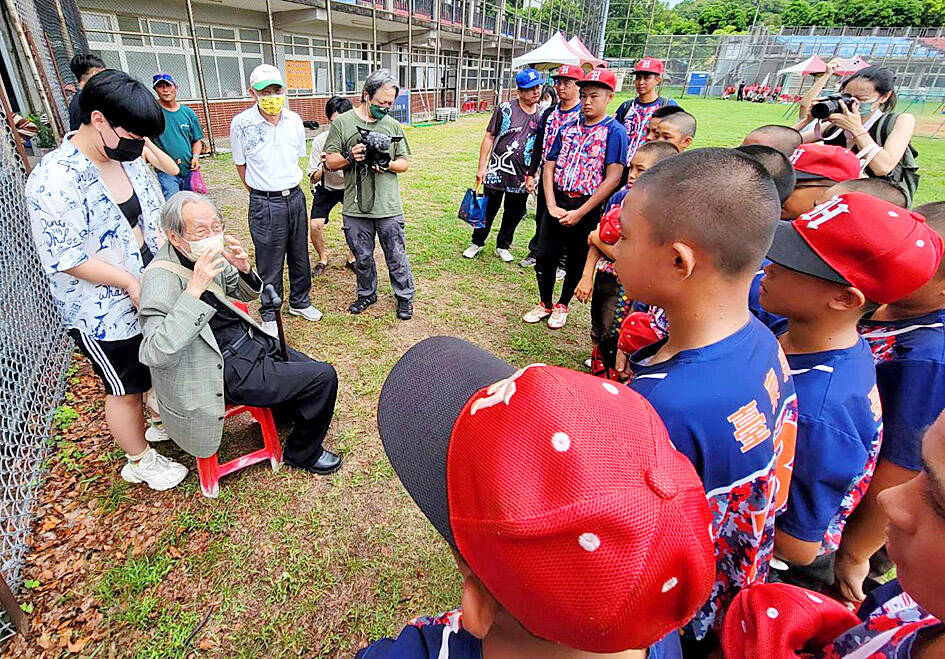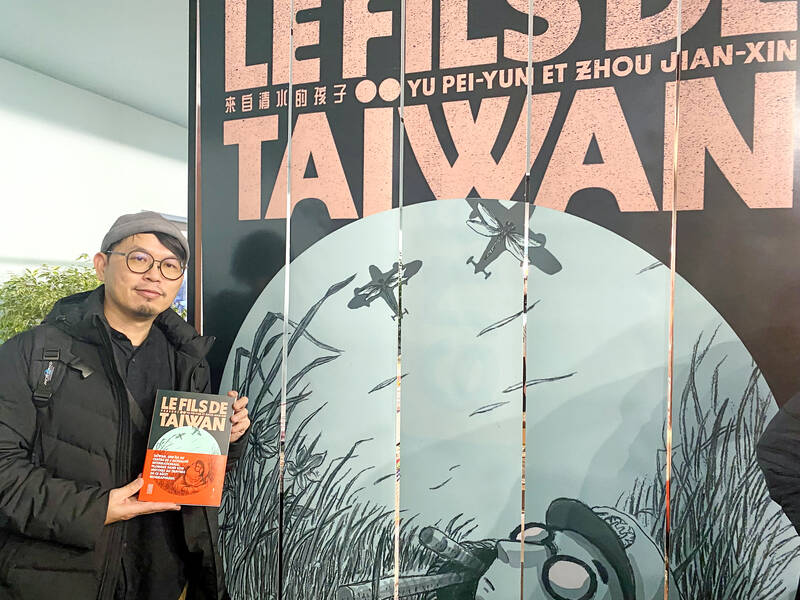Tsai Kun-lin’s (蔡焜霖) life was upended in 1950. Working overtime as a civil servant, he was suddenly taken to a jail, where he was wired up to a machine and electrocuted until he gave up the names of so-called “co-conspirators.”
His supposed crime was joining a “left-leaning” reading club in high school out of a love of literature and academic study.
Tsai, born in Taichung in December 1930, is one of a handful of people still alive who were subjected to political persecution in the White Terror era from 1949 to 1987, when the then-Chinese Nationalist Party (KMT) government had imposed martial law.

Photo: CNA
He endured torture and years of imprisonment at a “labor reform” camp on Green Island (綠島) after he was found guilty of “rebellion and treason.”
Aged 92, he is a living witness to Taiwan’s evolution from authoritarianism into a “full democracy,” a description the Economist Intelligence Unit bestowed upon the nation in its Democracy Index for last year.
Tsai’s and Taiwan’s hard-fought road to freedom were documented in Son of Formosa (來自清水的孩子), a four-book Chinese-language graphic novel, the French version of which attracted local readers at the Angouleme International Comics Festival in France in January.

Photo: CNA
The graphic novel was authored by Taiwanese writer Yu Pei-yun (游珮芸) and illustrator Zhou Jian-xin (周見信).
Yu compiled interviews with Tsai into a linear narrative with Slowork Publishing to deliver what became Tsai’s biography and a “Taiwanese history textbook.”
Tsai’s life was chosen as the focus in the retelling of Taiwan’s Martial Law era because of his experiences and intimate connection to that time in the Republic of China’s history.
Slowork Publishing president and editor Huang Pei-shan (黃珮珊) said that her company was inspired to publish the graphic novel after receiving countless inquiries at international comic book fairs about illustrated works on Taiwan’s history.
Framing the story was a challenge, Zhou said.
Early in the post-martial law period, people still refrained from talking about the White Terror era, he said, adding that even in movies for some time after, filmmakers generally avoided addressing the topic head-on.
“If we present history in an accusatory and critical manner, it may weigh too heavily on readers,” he said. “It could limit how far the story will reach, so we decided to start the narrative with a lighter tone and focus on stories about a boy before slowly diving into Taiwan’s history.”
The team behind Son of Formosa studied graphic novels that dealt with trauma and history, such as US graphic novel Maus and Japanese manga In This Corner of the World, both of which focused on World War II.
It found that those works told tragedies from “positive and humane” perspectives, Zhou said.
While the majority of Son of Formosa centers around the atrocities committed by the then-KMT government, the graphic novel was unbiased, covering the physical insurgency initiated by the people rooted in Taiwan historically against troops that arrived from China.
The heaviest part of Yu and Zhou’s graphic novel centered on how people survived adversity and traveled different paths in life, Zhou said.
“We hope our work can serve as a ‘presentation’ that introduces the perspective and background of each character against the backdrop of history, so readers can draw their own conclusions,” he said.
For example, the figures of authority — those who commit torture in the books — were depicted as either faceless or silhouettes, Zhou said.
“We did not want to simply create two-dimensional villains,” he said. “We wanted to get the readers to think, to ponder what those faceless figures represent. They could mean power, selfishness or even regular people forced to commit atrocities by authorities.”
In addition to Tsai’s past, Son of Formosa tells stories of other people persecuted during the White Terror, including Malaysian-born Taiwanese human rights advocate Chin Him-san (陳欽生).
Chin, who was born in 1949, was imprisoned for 12 years after being accused of involvement in the bombing of the US Information Service in Tainan in 1971.
During his incarceration, when he was held incommunicado, his illiterate mother could find no information about him. She had his name engraved onto a memorial tablet and placed at the alter of his ancestors.
Chin had his sentence overturned in 2019, an act that he said was superfluous, because he was “innocent all along.”
The graphic novel also depicts the murder in Taipei of the mother and seven-year-old twin daughters of former Democratic Progressive Party chairman Lin I-hsiung (林義雄) in 1980, and the self-immolation of publisher Deng Nan-jung (鄭南榕) in 1989 as an act of defiance to voice his dream for Taiwan to have freedom of speech.
It also touches on figures such as Carnegie Mellon University assistant professor of mathematics Chen Wen-chen (陳文成), a supporter of Taiwanese independence whose death in 1981 remains unsolved today.
Former “president Lee Teng-hui’s (李登輝) democratic reforms inspired me and that is what is important, not revolution, but rather peaceful reform,” Tsai said in the book.
The graphic novel has been translated into six other languages — English, Korean, Arabic, German, French and Japanese — with the Japanese version the most popular.

PRAISE: Japanese visitor Takashi Kubota said the Taiwanese temple architecture images showcased in the AI Art Gallery were the most impressive displays he saw Taiwan does not have an official pavilion at the World Expo in Osaka, Japan, because of its diplomatic predicament, but the government-backed Tech World pavilion is drawing interest with its unique recreations of works by Taiwanese artists. The pavilion features an artificial intelligence (AI)-based art gallery showcasing works of famous Taiwanese artists from the Japanese colonial period using innovative technologies. Among its main simulated displays are Eastern gouache paintings by Chen Chin (陳進), Lin Yu-shan (林玉山) and Kuo Hsueh-hu (郭雪湖), who were the three young Taiwanese painters selected for the East Asian Painting exhibition in 1927. Gouache is a water-based

A magnitude 4.1 earthquake struck eastern Taiwan's Hualien County at 2:23pm today, according to the Central Weather Administration (CWA). The epicenter of the temblor was 5.4 kilometers northeast of Hualien County Hall, at a depth of 34.9 km, according to the CWA. The earthquake's intensity, which gauges the actual effect of a temblor, was the highest in Hualien County, where it measured 2 on Taiwan's 7-tier intensity scale. The quake also measured an intensity of 1 in Yilan county, Taichung, Nantou County, Changhua County and Yunlin County, the CWA said. There were no immediate reports of damage or injuries.

OFF-TARGET: More than 30,000 participants were expected to take part in the Games next month, but only 6,550 foreign and 19,400 Taiwanese athletes have registered Taipei city councilors yesterday blasted the organizers of next month’s World Masters Games over sudden timetable and venue changes, which they said have caused thousands of participants to back out of the international sporting event, among other organizational issues. They also cited visa delays and political interference by China as reasons many foreign athletes are requesting refunds for the event, to be held from May 17 to 30. Jointly organized by the Taipei and New Taipei City governments, the games have been rocked by numerous controversies since preparations began in 2020. Taipei City Councilor Lin Yen-feng (林延鳳) said yesterday that new measures by

‘WORSE THAN COMMUNISTS’: President William Lai has cracked down on his political enemies and has attempted to exterminate all opposition forces, the chairman said The legislature would motion for a presidential recall after May 20, Chinese Nationalist Party (KMT) Chairman Eric Chu (朱立倫) said yesterday at a protest themed “against green communists and dictatorship” in Taipei. Taiwan is supposed to be a peaceful homeland where people are united, but President William Lai (賴清德) has been polarizing and tearing apart society since his inauguration, Chu said. Lai must show his commitment to his job, otherwise a referendum could be initiated to recall him, he said. Democracy means the rule of the people, not the rule of the Democratic Progressive Party (DPP), but Lai has failed to fulfill his